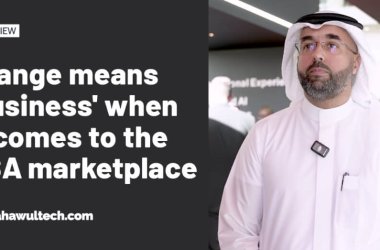 Eng Amjad Osama Arab, Chief Wholesale and Partnerships Officer at Etihad Salam Telecom Company, discusses the KSA’s rise from regional player to global competitor in digital transformation.
Eng Amjad Osama Arab, Chief Wholesale and Partnerships Officer at Etihad Salam Telecom Company, discusses the KSA’s rise from regional player to global competitor in digital transformation.
By 2025, the world will create 182 zettabytes of data annually, equivalent to 1.56 times the length of the Great Wall of China if the wall were filled with one terabyte hard drives. Yet, this tidal wave of data is not cascading into progress across the board.
In Saudi Arabia, data centre capacity lags 50-80% behind countries in the EU, USA, China, and Singapore. Rather than acting as a deterrent, the position of unfairness serves as a launchpad. A projected $18 billion investment pulling the nation’s data capacity from 300 MW to 1300 MW in addition to adding six new submarine cables to the existing 15 by 2030, foresees the Kingdom’s meteoric rise from regional player to global competitor. Through Vision 2030, Saudi Arabia is embarking on a sweeping digital transformation, underlined by multi-billion dollar investments in gigacities like Neom.
The ambition is crystal clear. As the world gravitates towards digitalisation, the kingdom is not merely participating, it is aiming to redefine the landscape. That said, a critical divide is emerging around the notion that only large corporations and well-funded institutions can fully leverage cutting-edge technology, while smaller businesses are left behind. This growing chasm hampers our collective capacity to harness the full potential of data centres as engines of progress and innovation.
Data centres are a key ally for businesses of all sizes to innovate, grow, and compete in the global marketplace while maintaining cost efficiency and sustainability. They offer scalable, secure, and cost-effective IT infrastructure, reducing the need for heavy upfront investment through pay-as-you-go models. Crucially, smaller enterprises get access to sophisticated technologies like cloud computing and AI, which might otherwise be prohibitively expensive. They also benefit from improved connectivity for global outreach and can focus on their core business by outsourcing IT management.
Data centres have the potential to level the playing field between resource-rich organizations and new beginners. However, realising this vision requires more than just powerful technology – it requires trust. This trust is an essential anchor in our digital future. While tech innovation may improve each business’ capabilities in the future, human intelligence will remain the critical backstop. Human experts provide the essential oversight and judgment that ensures data centre systems remain reliable and trustworthy.
With data centres in Riyadh, Jeddah & Al Khobar, international cable landing stations in Al Khobar and Jeddah as well as international connectivity bolstered by 24,000 km of fibre reaching and crossing seven borders, Salam is paving the digital superhighway of the Middle East capitalizing the Kingdom strategical geographical location and connecting east to west. Not only that, our embrace of digital hubs through strategic partnerships with prominent data centre owners, hyperscalers and submarine cable consortiums is enhancing national infrastructures and propelling Saudi Arabia into a central node of the global digital economy.
The real game-changer is energy. Saudi’s competitive edge in energy costs, courtesy of its abundant fossil fuel reserves, translates into significantly lower operational costs for data centre operations. This advantage, offering 30-50% savings compared to global averages, could sway the scales in favour of Saudi Arabia as a preferred destination for data centre investments.
Drawing from the growth metrics – a booming Saudi AI market expected to grow at a CAGR of 29% until 2030 and public cloud services where annual spending is projected to grow at a CAGR of 23% until 2029 demand outpacing global trends – it’s evident that the Kingdom is setting the stage for a digital renaissance. Salam’s initiatives, coupled with the government’s infrastructural and fiscal support, are not merely strategic moves but mark the dawn of a new era.
The future we envision is one where every organisation, regardless of size or resources, can harness the power of data. This isn’t a distant vision. At a personal level, stories abound of entrepreneurs and tech aficionados in Saudi Arabia who marvel at the speed of digital transformation affecting their businesses and daily lives. Young Saudi professionals, once eyeing opportunities abroad, now find a growing tech scene at their doorstep – a direct result of the infrastructural and economic shifts catalysed by digital infrastructure advancements.
With a groundswell of support, investment, and strategic foresight, the Middle East, spearheaded by Saudi Arabia, is not just on the path to catching up with more advanced digital infrastructure regions, it is on the verge of leapfrogging into a future where it could potentially lead. The world must now watch, wait, and, most importantly, be ready to engage with a dynamically transforming digital landscape coming from the heart of the Middle East.
Image Credit: Etihad Salam Telecom Company





